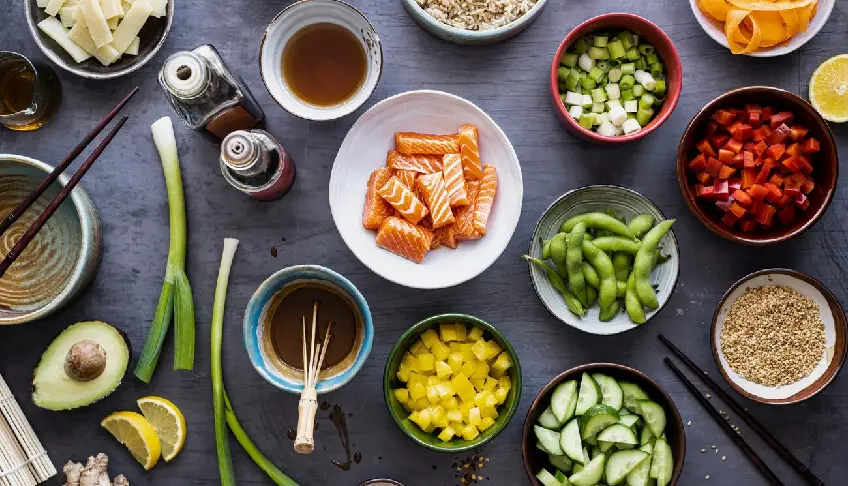The Health Benefits of Traditional Japanese Ingredients
The Health Benefits of Traditional Japanese Ingredients
Japanese cuisine has gained a lot of popularity in Australia and it’s not just because of its exotic taste or artistic presentation. Traditional Japanese ingredients are gaining popularity due to their great health benefits. Whether you’re exploring a crowded city or unwinding in the countryside—maybe while sampling Japanese cuisine in Sydney—adding Japanese ingredients to your diet can be a healthy addition to your way of life.
Many Japanese ingredients have been consumed for centuries, rooted in a food culture that values balance, freshness, and seasonality. Unlike many modern processed foods, traditional Japanese cuisine is low in saturated fats and carbohydrates, but high in minerals, fibre and fermented ingredients that aid digestion. As more Australians seek better diets, these time honoured ingredients offer both nourishment and cultural enrichment.
- Miso: Gut Health and Immunity
Miso, or fermented soybean paste, is a Japanese staple. It is most commonly consumed in miso soup, a favourite breakfast cuisine in Japan. Miso is a probiotic food rich in Lactobacillus, which benefits gut health and the immune system. These beneficial microorganisms can aid in balancing your digestive tract, decreasing bloating and enhancing nutrition absorption. Miso is rich in critical minerals like manganese, copper and zinc.
- Seaweed: The Iodine Powerhouse
Seaweed, including nori, wakame and kombu, is another traditional ingredient with numerous health benefits. It is one of the richest natural sources of iodine, a nutrient required for normal thyroid function. Seaweed is also low calorie and high fibre, which helps to regulate cholesterol and blood sugar levels. Its antioxidant content, including vitamins A, C and E, promotes skin health and lessens inflammation.
- Tofu: A Lean Source of Protein
Tofu, a soybean based product, is used in a variety of dishes, including soups and stir fries. It’s a good plant based protein source for vegetarians and anyone trying to reduce their consumption of red meat. Tofu is rich in calcium and iron, which support bone health and red blood cell production. Its isoflavones—plant-based compounds that mimic oestrogen—have also been linked to lower risks of heart disease and some hormone related cancers.
- Green Tea: Antioxidant Boost
No exploration of Japanese ingredients is complete without mentioning green tea, particularly matcha, which is powdered and consumed whole. Green tea is well known for its powerful antioxidants, especially catechins, which can help lower blood pressure and improve brain function. Regular consumption has been associated with a reduced risk of cardiovascular disease, enhanced metabolism, and even improved mood and focus.
- Daikon Radish: Detox and Digestion
Daikon, a mild flavoured white radish, is often served raw, pickled or simmered in Japanese dishes. It contains digestive enzymes that aid in breaking down fat and protein, supporting smoother digestion. Daikon is also known for its diuretic properties, helping the body eliminate toxins and reduce water retention. Low in calories and high in vitamin C, it’s a detox friendly addition to any meal.
- Natto: Heart and Bone Support
Natto is perhaps one of the more challenging Japanese foods for Western palates due to its strong smell and sticky texture, but it’s worth acquiring a taste for. This fermented soybean dish is a fantastic source of vitamin K2, crucial for bone health and cardiovascular function. It also contains nattokinase, an enzyme that may help prevent blood clots and improve circulation.
A Nutritional Legacy worth Exploring
The health benefits of traditional Japanese ingredients reflect centuries of culinary wisdom that prioritise balance, seasonality and nutrition. Whether you’re sampling these superfoods at a local eatery or enjoying Japanese food in Sydney, embracing these ingredients can be a small yet meaningful step towards better health.
More than just fuel for the body, these foods are tied to cultural rituals and daily practices that promote mindfulness around eating. Meals are often smaller in portion size, presented with care, and consumed slowly—habits that support digestion and satisfaction. The synergy between how the food is prepared and how it’s eaten contributes to the longevity and wellbeing often observed in Japanese communities.
The fusion of flavour and function makes Japanese cuisine not just a delight to eat but also a valuable ally in maintaining long term wellness.
Conclusion
From fermented soybeans to seaweed salads, traditional Japanese ingredients are more than exotic pantry items—they are nutritional powerhouses with proven health benefits. By integrating these foods into your daily diet, you can enjoy both delicious meals and enhanced wellbeing. Next time you’re dining out—perhaps indulging in Japanese food in Sydney—consider exploring dishes that celebrate these health-boosting staples.


